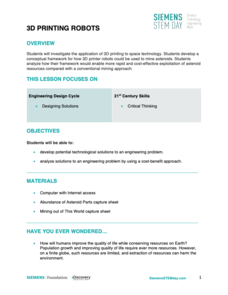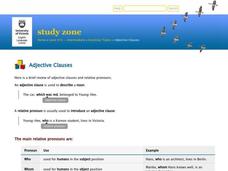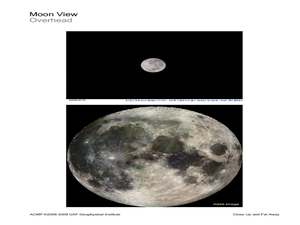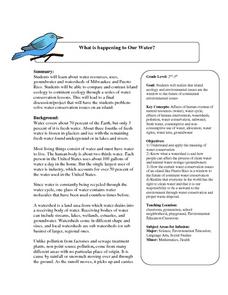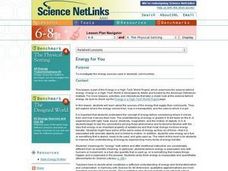Nuffield Foundation
Microbes Ate My Homework
Now you have a new excuse not to do your homework. A long-term experiment has learners explore cellulose-digesting enzymes. They simulate how paper breaks down in a compost bin. There's no need to blame your dog for eating your homework...
Discovery Education
3D Printing Robots
What is water worth to you? The answer probably depends on many different variables. Learners explore the value of water in space and what it takes to transport the resource to locations in a galaxy far far away. They then consider...
PBS
Stories of Painkiller Addiction: The Cycle of Addiction
Drug addiction, including prescription drug addiction, begins with a reason that's different for every user. High schoolers learn more about the reasons people begin abusing drugs with a set of videos and worksheets that discuss four...
Curated OER
Monarch Egg
Students investigate the stages of the Monarch butterfly and its life cycle. In this butterfly life cycle lesson, students discuss when, where, and how the Monarch butterflies lay their eggs. After discussion, students participate in...
Curated OER
Adjective Clauses
In this adjective clauses worksheet, students note the use of adjective clauses and relative pronouns and note the difference between non-defining and defining clauses.
Curated OER
Abiotic and Biotic Factors
Learners examine abiotic and biotic factors. They define biotic and abiotic, categorize a list of items onto a Venn diagram, label various items from areas on the school grounds as biotic or abiotic, and diagram a magazine picture.
Curated OER
Flying Against The Wind
Eighth graders discuss the various actions of non-Jewish Germans during World War II. Through various readings and activities, they explore the rejection of Nazi ideology and how many German citizens worked to help Jewish citizens during...
Curated OER
To Protect Your Streams, Protect Your Mountains
Students build and experiment with a watershed to understand the effects of pollution. In this movement of water lesson, students work in groups creating rock formations and change the viscosity of the liquids falling down the mountain....
Curated OER
It's (Not) Just a Bug: Simulating Invasive Insect Predation on a Plant Population
Students reflect on challenges that face farmers in cultivating crops, including insects. They then simulate how crops are affected by native and non-native insect populations and the options farmers have to protect their crops. Finally,...
Curated OER
Beaver Ecology
Learners explore the lives of bgeahvers. They identify the physical and behavioral adaptations that help beavers survive in their environment. Students compare and contrast how beavers influence the ecology of both forest and aquatic...
Curated OER
Compare and Contrast
In this compare/contrast worksheet, students look at pictures of a chair and a cat and read about they are similar and different. Next, students fill in a graphic organizer about how these 2 things are alike and different.
Curated OER
Reviving Celery
The classic in-class demonstration using celery dipped into water with food coloring is the highlight of this biology lesson plan. Young scientists discover that organisms are made up cells and have distinguishing characteristics. After...
Curated OER
Mammals Have hair or Fur
First graders complete computer activities, make a mask, separate pictures, and more having to do with mammals. In this mammals lesson plan, 1st graders classify animals as being mammals or non mammals based on their hair or fur.
Bulgarian Creative Writing Competition
Creative Writing Prompts For Every Season and Month
Winter, spring, summer, and fall! Every season is covered in a 14-page list of writing prompts. Included are story starters, reflection questions, poetry topics, and more.
K12 Reader
Civil Rights Biography: Dr. Martin Luther King, Jr.
Why do schools and government offices close one day every January to honor the birthday of Dr. Martin Luther King, Jr.? Young learners discover the achievements and lasting significance of this influential figure in American history with...
Curated OER
Close Up and Far Away
Students use magnifiers and telescopes to view things close up. In this magnifiers and telescopes lesson plan, students use the tools to identify things that are close and far away. Students tell details of things they can see closer.
Curated OER
Pollen & Pollination
Learners identify the different ways things are pollinated and how to manage pollen. In this pollination lesson students complete an experiment on how moths pollinate flowers.
Curated OER
All About Trees
Second graders examine the artwork of Robert Harris and discuss how trees are an important part of their lives. In groups, they discover how people's use of the environment has changed over time and describe the climate and vegetation...
Curated OER
Natural Resource Awareness
Seventh graders design a collage that shows natural resources or things made from natural resources. They discuss the collages and decide how they use natural resources at home and school. They listen to a read aloud of a Native American...
Curated OER
The Great Koala Rescue
Third graders examine an animal rescue that occurred in Australia by reading an article from National Geographic Kids Online. Individuals practice their non-fiction reading skills and are introduced to new terms as they investigate the...
Curated OER
What is Happening to Our Water?
Young scholars compare and contrast Wisconsin's water resources to that of Puerto Rico. They research books about islands, particularly the Puerto Rican islands. Student view illustrations of island ecology. They discuss the...
Curated OER
Water Is Cool!
Middle schoolers study water as a non-renewable resource. In this water instructional activity, students examine sources of water, uses of water, and explain why it is important to take care of water sources for the common good. They...
Curated OER
Energy for You
Students investigate the energy sources used in student's communities. They explore where the energy comes from, how it is transported, and the uses to which it is put. They review the meanings of vocabulary renewable and newable resources.
Curated OER
Learning from history: can it save lives?
Pupils research and document lessons learned from this disaster, then compile and synthesize information. They write effectively for public education purposes and use visual communications tools



